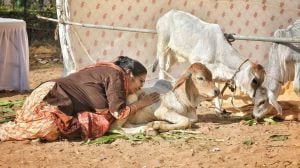SAARC ignores Pak request to mediate
COLOMBO, July 29: Pakistan's attempt to hijack the 10th SAARC summit by seeking to regionalise its dispute with India was scuttled when c...

COLOMBO, July 29: Pakistan8217;s attempt to hijack the 10th SAARC summit by seeking to regionalise its dispute with India was scuttled when chairperson and Sri Lankan president Chandirka Kumaratunga virtually turned down a proposal by Prime Minister Nawaz Sharif for SAARC mediation between the two countries.
Sharif proposed a 8220;peace, security and development initiative8221; which would include possibilities for 8220;mediation and conciliation8221; by SAARC foreign ministers and a conference on 8220;south Asian security and development8221;. The Pakistani prime minister said the conference8217;s task would be the preparation of an agreement on 8220;renunciation of the threat or use of force8221; and 8220;peaceful settlement of disputes8221;.
However, Kumaratunga, who took over the chairmanship of SAARC from Maldives president Maumoon Abdul Gayoom, firmly indicated that the grouping was not willing to overstep its brief as outlined in the charter which bars bilateral and contentious issues from the agenda.
8220;The summit has taken seriousnote of your innovative proposal. We pray and hope that the bilateral talks that are scheduled to take place between India and Pakistan will bear fruit in the manner you both wish it to and all of us in South Asia are hoping it would,8221; Kumaratunga said.
The India-Pakistan hostility cast a long shadow at the 10th summit of the South Asian Association for Regional Co-operationSAARC, with Prime Minister Nawaz Sharif seeking to regionalise the dispute while other members appealed to both countries to resolve their differences for the future of South Asia.
In his opening address, Indian Prime Minister Atal Behari Vajpayee sought to allay apprehensions of SAARC members over the momentous developments in the sub-continent by reaffirming India8217;s committment to good relations with neighbours through 8220;bilateral negotiations8221;.
Attempting to bring the focus back on economic co-operation, Vajpayee announced the lifting of quantitative restrictions on 2,000 products on a preferential basis for SAARC countriesfrom August 1. He also offered bilateral free trade agreements with countries that were interested in quot;moving fasterquot;.
Vajpayee also declared India8217;s commitment to intra-regional investment by announcing that investment projects up to US 15 million will be cleared on the fast track.
However, Sharif, proposing his initiative, said economic cooperation was impossible in the current hostile climate between India and Pakistan. It is believed that the SAARC council of foreign ministers, which met here earlier this week, vetoed the idea of the 8220;peace, security and development8221; initiative.
Sri Lankan foreign minister Lakshman Kadirgamar said on Tuesday that SAARC must not get enmeshed in political issues as these could be 8220;divisive8221; and must instead concentrate on socio-economic cooperation.
Sharif, stressing that peace was 8220;inseparable8221; from progress and development, said it was time SAARC redefined its role and priorities. 8220;In my view, the primary reason for the failure of SAARC to live up to itspromise lies in the fact that it excludes the discussion of political problems,8221; he said.
Though Kumaratunga steered clear of the proposal, in her inaugural address earlier, she voiced the concerns of other member countries when she said that the 8220;ambience of confidence8221; which was imperative for socio-economic cooperation in the region 8220;could be affected by the recent developments in South Asia8221;.
Making a pointed reference to the fourth SAARC summit in Islamabad and the eighth summit in New Delhi, Kumaratunga reminded the leaders of their declared intention to contribute to the objective of halting the nuclear arms race and eliminating nuclear weapons.
Other members, too, joined in. Declaring that the most complex of problems could be resolved peacefully, Sheikh Hasina of Bangladesh referred to her recent visits to New Delhi and Islamabad and said she was reassured by both leaders that they would resolve the problems via talks. Gayoom said the tests had raised 8220;new concerns8221; for the region andurged that the provision for informal consultations in SAARC be utilised by both countries to the fullest extent.
8220;We cannot afford to have cooperation in economic areas be hamstrung by disputes besetting the region,8221; Gayoom said, appealing for 8220;new mind sets8221; to resolve disputes. Perhaps in an indirect reference to Pakistan8217;s demand that informal consultations should be institutionalised in the SAARC agenda, he said such consultations should be made a regular feature of the grouping8217;s summits.
Nepalese prime minister Girija Prasad Koirala pitched in saying that with 8220;statesmanship and reason8221; all countries must learn to live with neighbouring realities.
- 01
- 02
- 03
- 04
- 05































